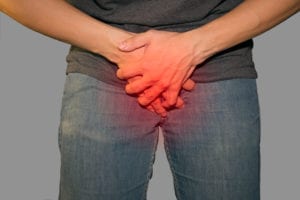Enlarged Prostate Doesn’t Just Affect Your Bladder

The most common symptoms of benign prostatic hyperplasia revolve around urination. Because your prostate gland is adjacent to the bladder, its enlargement can cause the blockage. This may result in frequent urination, difficulty starting urination, a sensation of fullness after urination, dribbling, and weak urine flow. These are the symptoms that most men have been told or experienced for themselves. But there’s more. BPH can also affect your sex life. Here’s how:
- Reduced sex drive and sexual satisfaction. This is related to the loss of sleep that stems from having to urinate frequently through the night more than it does any other aspect of BPH. Additionally, when the bladder feels uncomfortably full due to pressure from the blockage, anxiety may coincide with sex, diminishing the overall experience.
Treatment for enlarged prostate may be the underlying cause of
- Retrograde ejaculation is a side effect that may occur after transurethral resection of the prostate, a procedure called TURP. This does not occur in all men whose BPH is treated with surgery, but it is a potential side effect that we discussed before treatment. Retrograde ejaculation is a condition in which, during the climax, semen enters the bladder rather than exiting the penis.
- Lowered libido. Conservative treatment for BPH may involve oral medication such as a 5-alpha-reductase inhibitor. If you are taking this type of medication and are experiencing a drop in your sex drive, talk with your doctor about potential alternatives to your current treatment plan. Lowered libido may also coincide with erectile dysfunction, which may occur in approximately 10% of men treated for BPH.
An enlarged prostate is a problem for which multiple treatment options exist. The advantages of treatment outweigh the potential downsides for most men. To learn more, contact the Chattanooga office of UT Urology at (423) 778-8765.

